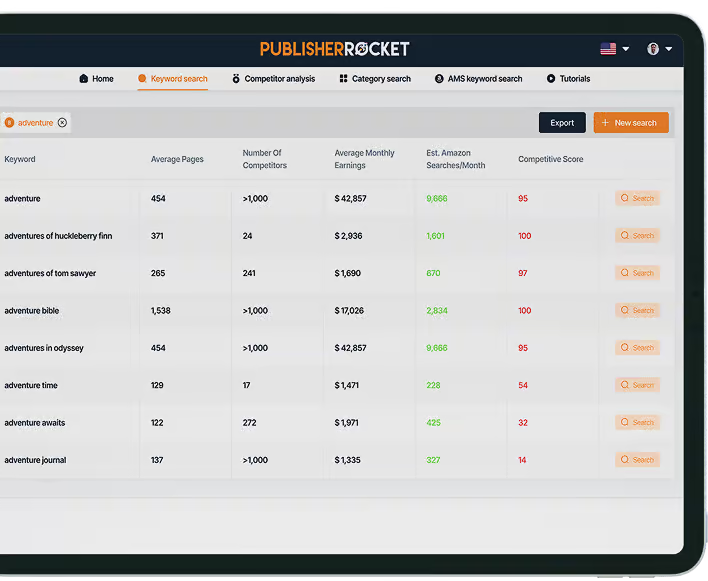Ebook piracy is real. More websites have stolen or claim to have stolen your book than you probably realize.
There it is, sitting there, available for anyone to download for free.
Every sale you hoped for could be gone.
And most of these sites have no contact page and are probably not even in your country.
So how do you fight back without getting yourself in legal trouble or wasting hours on dead ends?
In this article, I’ll show you a legal, safe, and surprisingly simple way to get your book back from these pirates. You don’t need to be a tech genius. Even if your book isn’t finished yet, knowing this now will save you headaches later.
- When to act and when to leave it alone
- The steps to get the pirates to release your book
- How to get Google to slap them around
- And more…
Before You Get Justice…
Ebook piracy happens when a website or person takes a copy of your book and puts it online for free download. In most cases, though, they don’t actually have your book. They are just trying to lure people in.
So before you go full Klingon and serve them a dish best served cold, here’s my advice for most authors: if you see someone offering your book for free, it’s usually smarter to leave it alone and move on.
Why? Isn’t piracy bad?
Yes, but here's the thing…
1. Most of the time, they don’t have your book.
They scraped your title off Amazon because it looked popular or had potential. Then they claim it’s available on their site. Usually, there are two reasons for this:
- They want people to pay a subscription to access the “free” book.
- They will “send you the book,” but it’s actually a virus.
In other words, you are often safer not trying to track down these pirates.
There's also this:
2. The effort usually isn’t worth it.
The amount of work it takes to get a pirated copy removed is rarely justified by the book sales you might be losing. Most people looking for free books aren’t going to pay for one anyway.
Sometimes a pirated book even works in your favor. As Tim Grahl has shown, it can help indie authors reach new readers.
Still, I understand the instinct. Knowing someone is lying to readers or scamming them using your book can feel infuriating. That drive for justice is natural.
So if it's justice you seek, here are several steps to help you achieve it.
Want to preemptively protect your book?
Sure, you can submit a copyright registration for your book. This takes time, but you can follow the process here. You can also protect your book via blockchain in less than 60 seconds with Instant IP. Get your first credit FREE here by using my affiliate link.
Step 1: Contact The Writer/Owner/Editor
Probably the most obvious of steps, yet often overlooked and more effective than you’d think with these cheap book thieves.
Why?
Because they are probably not making much money off of your book specifically, so instead of endangering their website/business (for fear that you are savvy with the ways of the Internet force and have read this article), they’ll acquiesce to your request and remove the one single page.
But what if they don’t have a contact page or way for you to contact them?
That’s okay because we’re going to use Whois to find out all we need to know about this website.
To do this, navigate to https://www.whois.com/whois/ and type in the pirate website’s domain name.

Whois is awesome because it not only lists their personal contact information (unless they paid for privacy… which, fair warning, most do these days), but also lists where their website’s domain is registered, who their hosting service is, when they bought the domain, and more.
Basically, it’s useful for figuring out information about any website out there.
And that information is going to be important for these next couple steps. So, keep this information handy as we move forward.
Now, scroll down to the “Registrant” or “Administrative” and see if there's an email address listed.
If it says something like “privacy@servername.com” or gives you a contact URL, don’t worry. Just send an email to that address (or URL), and it will get redirected to their real email.
Now that you have the owner’s email, craft a well thought out email that details your displeasure in the matter, your request that they remove it, your rights, and the steps below that you WILL take if they don’t comply.
Step 2: Contact the Host/DNS Provider
If you’re at this step, then they either didn’t have contact information readily available, didn’t respond, or they said they were disinclined to acquiesce to your request.
So, let’s take it to the next level. In this step, we will contact the hosting company – the people who house their website on their servers.
What good will that do?
These hosting servers have more to lose than some sneaky pirated ebook. If it's found that they are hosting illegal sites and are not in compliance, they could get shut down and lose their business. Plus, most of them don’t want illegal activity on their servers.
But how do we find out who their hosting service is?
Simple! We go back to Whois Lookup.
Now, to find out who their hosting service is, you want to scroll down in Whois until you see “Name Servers.”

These servers usually look like “ns1.somehostingcompany.com.” In the example above, it is Bluehost.com.
In this case, you’d want to go to “somehostingcompany.com” and look for a “Contact Us” form or an “Abuse” form and file your complaint there.

When you contact them, be sure to use your best legalese and state the following:
- The violations occurred by the website owner
- Specific URL you want to be taken down with a “fix it or else” type statement
- Inform that you tried contacting the owner of the site directly but they were unresponsive
- Your next step will be to file a DMCA (more on this later)
Note:
If you see cloudflare.com for the name server, it doesn't mean Cloudflare is the website's hosting company. It means the website is using Cloudflare for its DNS records, but the actual hosting company (SiteGround, Bluehost, Rocket.net, etc) will be someone else and you'll need to skip Step 2.
Step 3: Contact the Registrar
Many of the scourge of the Internet actually have their own hosting service (you can basically turn any old computer into a web server), so sometimes trying to contact their “hosting service” will do no good.
But that’s okay. We can kick it up a notch because even if they have their own hosting, they CAN’T have their own Registrar.
For this, we again look at the Whois info and locate their “Registrar Abuse Contact Email” and/or “Registrar Abuse Contact Phone.”

If a phone number is available, it’s best to pick up the phone and contact the Registrar with your complaint. Since its a copyright infringement, you have a decent shot at getting the information removed pronto.
If for some reason, you don’t get through to them on the phone or no phone number is listed, then send an email to the Registrar Abuse Contact Email with the compiled information and close your email with the statement “My next step is to follow through with a DMCA request since you are dealing with stolen content.”
That ought to get ‘em!
Step 4: Enter the DMCA Dragon
If nothing has happened yet, then it is time to roll up your sleeves and slap them around for real. In this case, a dish served cold with a side of DMCA.
A Digital Millennium Copyright Act (DMCA) is supposed to protect the owners of content from copyright infringement on the web. It’s basically a formal action.
So, why not just start with this? Because DMCAs are supposed to be the last resort against book piracy. It’s the “I’ve tried everything and they didn’t listen so here comes the boom” move.
Most of the hosting services and registrars have a specific page for submitting a DMCA. The best way to find this is to do a Google search with the “Name of the Company” + “DMCA”.
As an example, here is HostGator’s DMCA page.
If the company you're looking for doesn't have a DMCA, then you’ll need to create your own and send it to them or their legal department. You can also use the current US Copyright Office DMCA portal: https://www.copyright.gov/dmca/
When filling out a formal copyright claim, you’ll need to list some of the following:
- Your full name and contact information
- Exactly who you are filing this DMCA against (website owner, host, registrant, etc. – you need to do a separate one for each)
- Take a screenshot of the blatant abuse
- Provide proof that you attempted to contact the violator
- Sign it yourself (electronic signatures are sufficient)
- State that you are complaining in “good faith”
- State that “under penalty of perjury, the information contained in the notification is accurate”
- State that you have the right to submit this DMCA because you are the copyright owner or the owner’s agent.
Here you can find a couple of templates to use:
Also, to help this step move in a better way, be sure to check out my article on Book Copyright pages and what to put in them. Having a strong copyright page will go a long way to helping to bolster your argument. Also, there are extra steps you can take in order to formally copyright your book other than just publishing as well.
Step 5: The Final Takedown with a Google Slap!
Hopefully, by now, you’ve made some progress with all of this. But here’s the thing…even though the website finally complied, their cache might be slow to change.
Therefore, to get the Internet and Google to stop showing the page, you need to tell Google to remove the URL.
To do this, go here: https://search.google.com/search-console/remove-outdated-content
Then Google will get to work ASAP so no one in the near future will stumble upon it.
Tools to Do the Work For You
If the above steps seem a little overwhelming for you, don't worry, you're not alone. Thankfully there are a few services that make this possible, though I haven't had the chance to personally test them myself.
If you're looking for a service to help out, I recommend one of these options:
- MUSO – $8/month per book or $80/month for all your books (alternatively, you could pay $670 annually)
- Pirat.io – contact them for pricing
As I mention above, using a service like these might not be worth the time or expense for 99% of authors, but if you really want the service, the above options should work for you.
But What About Blasty?
If you've hunted Google for some other options, you may have heard about a program that could blast these pirates out of the way.
It was called Blasty, but… alas, it went the way of the dodo in 2019.
Frequently Asked Questions
Yes. Sharing or downloading a book without the copyright holder’s permission is a violation of copyright law. Even if it’s just a single copy, it’s still considered theft because it isn't your intellectual property. The good news is that there are legal tools and takedown processes, like DMCA notices, that give authors a way to reclaim control.
Surprisingly common. There are thousands of sites claiming to host free copies of popular ebooks. That said, most of these sites don’t actually have your book – they’re either luring users into paying for a fake subscription or trying to spread malware. In other words, seeing your book “for sale” for free online isn’t automatically a lost-sale emergency.
Amazon and Kindle have protections, like digital rights management (DRM), that make it harder for readers to copy and distribute your book. But no system is perfect. That’s why it’s still useful to know how to spot and respond to pirate sites.
Most of the time, the simplest move is to leave it alone. Many pirate sites don’t actually have your book, and chasing every link isn’t worth your time. If you do decide to act, follow the steps outlined in the article: find contact info via Whois, reach out to the site or hosting company, and escalate to a DMCA takedown if needed. Keep your approach methodical and professional.
Yes. There are a few companies, like MUSO and Pirat.io, that monitor the web and issue takedown notices on your behalf. For most authors, it’s not worth the monthly fee. But if you want to save time or avoid the hassle, these services can do the heavy lifting and give you peace of mind.
Ebook Piracy: What Now?
Hopefully, you didn’t go through all of that just to save a few sales. But if you did, or if it felt necessary, then kudos to you and may the Copyright force be with you. The steps I outlined have worked two out of the three times I’ve used them. The third time? Not entirely sure what happened, but the owners had covered their tracks pretty well.
The point is, you no longer have to feel helpless if your book is being stolen or your digital content is being used without your consent.
You now have the tools and the know-how to take action. Whether it’s worth your time is up to you.





